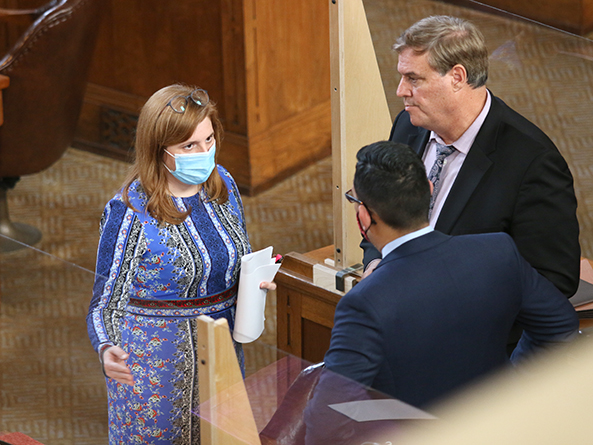Legislature will investigate child welfare contract
Lawmakers established a committee March 29 to investigate the bidding process for service provision in one of the state’s child welfare service areas.

Nebraska implemented a statewide privatization of its child welfare system in 2009. By 2012, the experiment had failed and all service areas except the eastern — serving Douglas and Sarpy counties — had returned to casework provision by the state Department of Health and Human Services.
In 2019, the department awarded a $197 million, five-year contract as provider for the eastern service area to Saint Francis Ministries. LR29, introduced by Omaha Sen. Machaela Cavanaugh, states that Saint Francis Ministries has estimated a $27 million operating loss for the first year of the contract and may be at risk of bankruptcy.
Cavanaugh said the awarding of the contract to Saint Francis Ministries — whose bid was 40 percent lower than the next highest bidder, PromiseShip, which held the contract at the time — needs to be investigated.
LR29 creates the Eastern Service Area Child Welfare Contract Special Investigative and Oversight Committee to study the procurement process undertaken by DHHS and Administrative Services to award, implement and oversee the contract.
As introduced, the resolution also would have required the committee to investigate placement and quality of care received by children in Nebraska’s eastern service area. An Executive Board amendment, adopted 29-0, removed oversight of quality of care issues and focuses the committee’s work on the bid process.
The amendment also establishes the committee membership to include two members each from the Appropriations, Government, Military and Veterans Affairs, Health and Human Services and Judiciary committees as well as one at-large member of the Legislature who is a resident of the eastern service area.
Cavanaugh said the history of child welfare privatization in Nebraska is indicative of systemic problems with how the state approaches caring for vulnerable children.
“We still have so many unanswered questions,” she said. “It’s time for us to do something different for the children of Nebraska — but we shouldn’t act rashly. We should know what’s happened, how we got here and how to appropriately move forward.”
The committee has subpoena power and will report findings and recommendations to the Legislature by Dec. 15, 2021. The committee will terminate Dec. 31, 2022.
Sen. Mark Kolterman of Seward supported the proposal, saying DAS has fought previous attempts to put parameters around the procurement process — particularly the ability of an entity that loses a bid to appeal that decision.
He said the state needs to get to the bottom of the bidding process for the eastern service area for the sake of large state contracts in the future.
“We have got to have a process in place where a bidder knows that they’re going to get a fair shake,” Kolterman said.
Executive Board chairperson Sen. Dan Hughes of Venango offered an amendment, adopted 38-0, that requires the investigative committee to obtain authorization from the Executive Board before it can issue subpoenas.
“We need to make sure that the subpoena power of the Legislature is intact and can be used as effectively as possible to get our job done,” Hughes said.
Lincoln Sen. Mike Hilgers supported the amendment, saying preauthorization for subpoena power currently is required of standing committees under the Legislature’s rules. A special committee should not have the power to do what a standing committee cannot, he said.
Omaha Sen. Steve Lathrop offered an amendment that would have required the Executive Board to approve all subpoenas issued by the investigative committee unless a subpoena was attempting to secure documents or the attendance of witnesses outside the scope of LR29 or was not in proper form.
Lathrop said that in order for the oversight committee to be effective, it needs all available tools to ensure that it can get the answers it needs. The Legislature often has been stonewalled by state agencies, he said, when senators cannot compel compliance with information requests.
“Subpoenas are a tool to find the truth,” Lathrop said.
Sen. Megan Hunt of Omaha supported the amendment, saying she was concerned that the Executive Board might “slow walk” subpoena approval if granting it potentially could embarrass the executive branch of government.
The Lathrop amendment failed on a 20-18 vote. Twenty-five votes were needed. Following adoption of a technical amendment, senators voted 40-6 to approve LR29.


